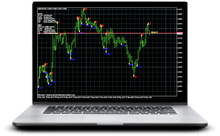Recession
Recession
What is a recession?
A recession is most commonly defined as a prolonged and prominent decline in economic and financial activities. While there are different opinions on when exactly a seemingly temporary economic downturn can be considered a recession, the general consensus is that two consecutive quarters of negative gross domestic product (GDP) constitute a recession.
Apart from declining GDP, recessions are accompanied by high unemployment rates, low government spending, and real income. This, in turn, negatively affects the buying power of consumers, which causes the market demand for certain products to decrease. In order to stay afloat, the companies lower their production rates and most often have to lay off a significant part of their workers, which only compounds the problem.
However, despite its adverse effects, a recession is considered a normal part of any economy. It is inevitable and always follows one period of economic expansion while laying the groundwork for another.
What causes a recession?
Looking at the causes of a recession from a broader perspective, it starts when the business cycle is at its peak during an economic expansion. Since the economy is doing well, consumers have a strong buying power and drive the product demand higher and higher. To handle this pressure and maintain the necessary supply, companies raise prices. At the same time, banks and other lending institutions make it easier for both consumers and production companies to borrow money and acquire more debt.
However, at a certain point, one or several events derail the economic expansion and make it impossible for consumers and companies to contribute to the demand and supply equation and simultaneously keep up with their financial obligations to their lenders. The economy stops growing and enters a new period of recession, lasting from several months to several years.
As for the events that can disrupt the economy, there are several possible causes that can trigger a recession:
- High inflation rate — inflation is a rise in the price of goods and services that causes the loss of purchasing power over time. In and of itself, inflation is a natural phenomenon as it encourages economic growth. However, when inflation rates get too high, the wages can’t keep up with the price increase, causing economic activity to slow down, and the measures the authorities take to combat it can lead to short-term unemployment and even an economic recession.
- Oversupply — when the demand is high, companies strive to produce as many goods as possible. But as the demand peaks and decreases, the supply becomes too excessive, making it hard for companies to sell the goods. This can lead to businesses downsizing, many people losing their jobs and purchasing power, falling consumption, and economic disbalance.
- Economic bubbles — an economic bubble refers to a rapid increase in the price of some asset, even if its intrinsic value is much lower. This can happen during a strong economy for various reasons, including speculation, consumer confidence, or current market trends. Investors become too optimistic and try to buy as much of the asset as possible to sell it once the price seems right. However, when the time comes, supply overwhelms demand, causing prices to drop and sellers to crash the market in panic, which in turn can lead to a recession.
- Economic shock — sometimes unexpected global or local events can create a severe financial problem, leading to economic uncertainty as consumers and businesses become reluctant to spend their money. The most recent example is the COVID-19 pandemic, but other potential triggers generally include wars, natural disasters, and disruptions in the supply of necessities (for example, oil).
- High deflation rate — even though high inflation is very dangerous, deflation can also lead to a recession. Deflation is a price decline that eventually leads to a decrease in wages and a further decline in prices. This discourages businesses from producing more goods, which causes economic activity to decline and undermines the economy.
These events can occur separately or together at the same time, but their impact on the economy can set off a new wave of recession.
How does a recession affect trading?
Since a recession affects every economic facet, it also significantly influences financial markets. During recessions, traders and investors are far more cautious about spending their money. Some can even start panicking and withdrawing their money from their existing trades and investments to save their profits before the markets plummet, which only exacerbates the downturn. But even those who hold on to their open positions can see the value of their investments decrease drastically and aren’t safe from the negative consequences of a recession.
However, some assets are more resilient to recessions and perform well during economic turbulence, sometimes even increasing in value despite the pessimistic outlook. This happens because recessions affect various financial markets and securities differently, making trading during recessions possible, even if quite difficult.
Stock market
The stock market always takes most of the damage when a recession comes. It happens because the overall economic decline also affects most companies. Recessions are always accompanied by an increase in debt payments and a decrease in revenue, which causes the price of stocks of underperforming companies to drop as their potential can no longer justify the monetary investments quickly.
Because of this, many traders try to sell the stocks they already own to make up for the money they have already invested and drive the stock prices down. Seeing this, other traders try to take advantage of the price dip and buy these stocks while they are cheap, which drives the prices back up. This creates volatility, making it impossible to calculate where the market will move next.
This makes stock trading during a recession very risky, especially since many companies may be on the verge of going bankrupt. The riskiest stocks to trade and invest in during recessions are:
- speculative stocks
- stocks of highly leveraged companies
- cyclical stocks
Despite this, it’s still possible to trade stocks during a recession. Still, it’s important to gather information about a company’s cash flow, debt, and performance history in challenging economic situations before investing your money in its stocks.
Forex market
When a recession hits a country, its government usually tries to cut interest rates in order to mitigate its consequences and speed up the economy’s recovery. However, this weakens the currency's strength on the global Forex market, making it less appealing to traders and investors. Because of this, Forex trading isn’t safe from negative recession impacts either.
However, recessions rarely affect the whole world, so there are usually countries with economies performing relatively well in these conditions. This creates many opportunities for Forex traders to capitalize on the differences between a strong and a weak currency.
The world of Forex is all about balance. If one currency plummets, another will become stronger. So traders and investors can use weak low-interest currencies to buy strong higher-interest ones. Typically, some currencies are considered safe havens that traders can use to protect their capital. These currencies include the Swiss franc (CHF), the US dollar (USD), and the Japanese yen (JPY).
However, it’s also important to be careful before investing in these currencies, as they can lose some of their value when other countries’ economies start recovering from the recession.
Commodities
As for commodities, their value depends on whether their production rates have been affected by a recession. If a company has to slow down production due to a lack of demand and consumers’ low buying power, the price of the commodity it produces also falls. The value of perishable commodities (for instance, grain) also declines much quicker as they can’t be stored long.
At the same time, some commodities can still act as safe-haven investments. These generally include precious metals such as gold, silver, platinum, etc., as they can maintain their value even in bear markets. In particular, gold is the most sought commodity during recessions as it has a long history of being used as a currency in trading, as a material to create jewelry and art, and even in medicine. Even if the value of these commodities doesn’t increase, they still prove to be a better and more stable alternative to stocks.
Bonds
Government bonds, especially issued in countries with strong economies (like the US), are considered safe-haven investments, so their value tends to rise during recessions. Even central banks purchase bonds to stimulate the economy’s recovery. Some bonds perform better when interest rates are low, and others rise in price when interest rates increase, so it’s important to gather enough data to make an informed decision.
How to predict a recession?
Unfortunately, there is no 100% accurate way of predicting an impending recession. However, some indicators can give economists warnings about potential economic downturns coming their way. For instance, rising unemployment rates can expose the start of a recession since fewer jobs (especially connected to the production of goods) means consumer spending and demand are decreasing.
One of the most significant indicators is an inverted yield curve.
A yield curve demonstrates the relationship between short-term and long-term government bonds. The long-term yield will be higher when the economy is doing well. However, if the yield curve is inverted, with the long-term yield being lower, this can signal a lack of faith in the economy, the beginning of economic instability, and a potential recession in the near future.
Differences between recession and depression
“Recession” and “depression” are very close economic terms, but there are still some differences. An economic depression is much more severe than a recession, leading to more severe consequences. Depressions are also longer than recessions, lasting at least months but several years.
For example, the Great Depression lasted more than four years, starting in 1929 and ending in 1933. It took almost a decade for the economy to recover from it. In comparison, the Great Recession of the late 2000s lasted from the end of 2007 until the middle of 2009, which is significantly shorter.
How long do recessions last?
Recessions can last from several weeks to several years, depending on how badly an economy is affected and whether the authorities managed to take adequate measures to mitigate its effects. On average, a recession can last somewhere from 11 to 17 months, with the longest recession in US history taking more than five years to go away. Unfortunately, it’s impossible to predict exactly when a recession will end, so the only thing to do is wait.
Example of a recession
The most recent and major example is the recession that followed the COVID-19 pandemic. Back then, the economies of countries around the world experienced a very sharp dive as many businesses had to shut down and stop the production of goods. This caused the stock market to crash as many companies went bankrupt despite their governments’ efforts to ease their financial burdens.
FAQ
Can you trade during a recession?
Yes, trading during a recession is possible. Still, it’s important to either trade less volatile markets or, if you want to trade stocks, conduct proper research into a company’s financial position.
Is it safe to invest during a recession?
Investing during a recession can be profitable but also quite risky. It’s hard to tell how an asset’s price will move in volatile markets. When investing in stocks, there’s also a possibility that a company might go bankrupt.
What is the best trading strategy for a recession?
In a recession, it is better to trade long-term and invest money in more-or-less stable safe-haven assets, like gold, silver, strong currencies (CHF, USD, JPY), and government bonds.
2023-04-11 • Updated











